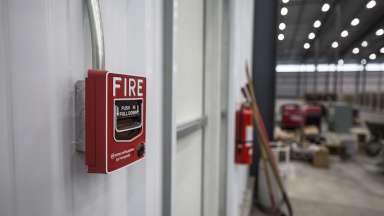Jump To:
Property Management or Owners
Addresses
Section 505.1 states that new and existing buildings shall have approved address numbers that are plainly legible and visible from the street fronting the property. Numbers shall be a minimum of 4 inches high on a contrasting background.
Sprinkler
Section 903.3.1.2 of the Fire Code requires a NFPA 13R Sprinkler system in all apartments up to and including 4 stories in height built since 2006.
Fire Department Access
Section 503 of the Fire Code addresses fire department access. If the fire department is needed, it is vital that our apparatus can reach you! Please maintain access roads with an unobstructed width of 20 feet and a vertical clearance of at least 13 feet 6 inches.
Storage and Combustible Waste
Combustible waste material shall not be allowed to accumulate as required by Section 304.1 of the Code. This includes but is not limited to wastepaper, wood, hay and pinestraw. Further, combustible materials shall not be stored in exits, exit enclosures, boiler rooms, mechanical rooms, or electrical rooms.
Smoke Alarms
Single or multiple station smoke alarms shall be installed and maintained on the wall or ceiling outside of each separate sleeping area, in each room used for sleeping, and in each story.
Fire Extinguishers
Fire Extinguishers are required by Section 906 of the Fire Code. The extinguishers must be placed in a conspicuous location, no higher than 5 feet of the ground. Extinguishers shall not be obstructed or blocked from view and the maximum travel distance can not exceed 75 feet.
Residents
Portable Unvented Heaters
Portable unvented fuel-fired heating equipment is prohibited per Section 604 of the Fire Code.
Grills
Section 308 of the NC Fire Code addresses grills. Specifically, Section 308.3.1 states that charcoal burners and other open flame cooking devices shall not be operated on combustible balconies or within 10 feet of combustible construction.
Section 308.3.1.1 states LP gas burners with a LP gas container having a capacity greater than 2.5 pounds shall not be located on combustible balconies or within 10 feet of combustible construction.
The Raleigh Fire Marshal's Office recommends not using grills in apartments at all.
Recreational Fires
Section 307 of the Fire Code prohibits the use of recreational fires within 25 feet of a structure or combustible materials. No open flame device should be used on a combustible surface such as a deck.
